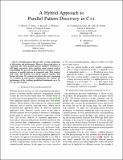Files in this item
A hybrid approach to parallel pattern discovery in C++
Item metadata
| dc.contributor.author | Brown, Christopher Mark | |
| dc.contributor.author | Janjic, Vladimir | |
| dc.contributor.author | Barwell, Adam David | |
| dc.contributor.author | Thomson, John Donald | |
| dc.contributor.author | Castañeda Lozano, Roberto | |
| dc.contributor.author | Cole, Murray | |
| dc.contributor.author | Franke, Bjoern | |
| dc.contributor.author | Garcia-Sanchez, Jose Daniel | |
| dc.contributor.author | Del Rio Astorga, David | |
| dc.contributor.author | MacKenzie, K. | |
| dc.date.accessioned | 2019-12-06T16:30:02Z | |
| dc.date.available | 2019-12-06T16:30:02Z | |
| dc.date.issued | 2020-05-14 | |
| dc.identifier | 264080323 | |
| dc.identifier | 2cc928b9-e1b1-4bdf-9db0-d7b5c937ec23 | |
| dc.identifier | 85085473207 | |
| dc.identifier | 000582555800028 | |
| dc.identifier.citation | Brown , C M , Janjic , V , Barwell , A D , Thomson , J D , Castañeda Lozano , R , Cole , M , Franke , B , Garcia-Sanchez , J D , Del Rio Astorga , D & MacKenzie , K 2020 , A hybrid approach to parallel pattern discovery in C++ . in 2020 28th Euromicro International Conference on Parallel, Distributed and Network-Based Processing (PDP) . , 9092377 , Proceedings - Euromicro Workshop on Parallel and Distributed Processing , IEEE Computer Society , 28th Euromicro International Conference on Parallel, Distributed and Network-based Processing , Västerås , Sweden , 11/03/20 . https://doi.org/10.1109/PDP50117.2020.00035 | en |
| dc.identifier.citation | conference | en |
| dc.identifier.isbn | 9781728165837 | |
| dc.identifier.isbn | 9781728165820 | |
| dc.identifier.issn | 1066-6192 | |
| dc.identifier.other | ORCID: /0000-0003-1236-7160/work/79918199 | |
| dc.identifier.other | ORCID: /0000-0001-6030-2885/work/79918526 | |
| dc.identifier.uri | https://hdl.handle.net/10023/19088 | |
| dc.description | Funding: EU Horizon 2020 project, TeamPlay, grant number 779882, and UK EPSRC Discovery, grant number EP/P020631/1. | en |
| dc.description.abstract | Parallel pattern libraries offer a strong combination of abstraction and performance. However, discovering places in sequential code where parallel patterns should be introduced is still highly non-trivial, often requiring expert manual analysis and profiling. We present a hybrid discovery technique to detect instances of parallel patterns in sequential code. This employs both static and dynamic trace-based analysis, together with hotspot detection. We evaluate our pattern discovery mechanism on a number of representative benchmarks. We evaluate the performance of the resulting parallelised benchmarks on a 24-core parallel machine. | |
| dc.format.extent | 5 | |
| dc.format.extent | 191078 | |
| dc.language.iso | eng | |
| dc.publisher | IEEE Computer Society | |
| dc.relation.ispartof | 2020 28th Euromicro International Conference on Parallel, Distributed and Network-Based Processing (PDP) | en |
| dc.relation.ispartofseries | Proceedings - Euromicro Workshop on Parallel and Distributed Processing | en |
| dc.subject | QA75 Electronic computers. Computer science | en |
| dc.subject | T Technology | en |
| dc.subject | T-NDAS | en |
| dc.subject.lcc | QA75 | en |
| dc.subject.lcc | T | en |
| dc.title | A hybrid approach to parallel pattern discovery in C++ | en |
| dc.type | Conference item | en |
| dc.contributor.sponsor | European Commission | en |
| dc.contributor.sponsor | EPSRC | en |
| dc.contributor.institution | University of St Andrews. School of Computer Science | en |
| dc.identifier.doi | 10.1109/PDP50117.2020.00035 | |
| dc.identifier.grantnumber | 779882 | en |
| dc.identifier.grantnumber | EP/P020631/1 | en |
This item appears in the following Collection(s)
Items in the St Andrews Research Repository are protected by copyright, with all rights reserved, unless otherwise indicated.

